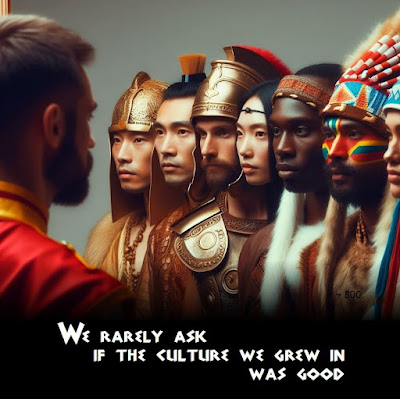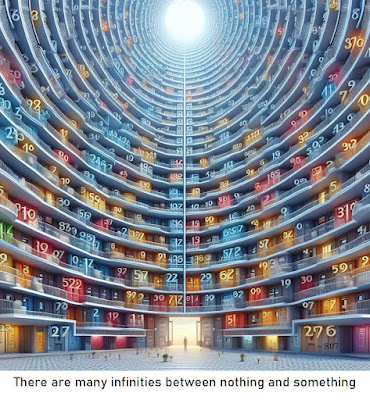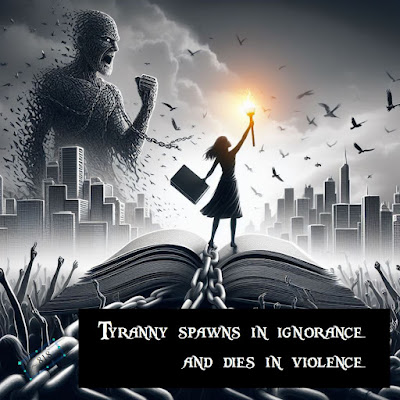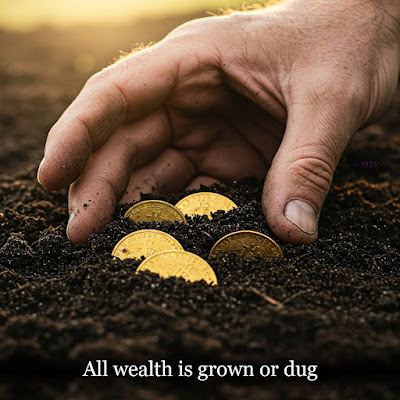Saturday, May 31, 2025
Friday, May 30, 2025
Look at me, Mommy! Look at ME!
From silent screens, a chilling tale I'll tell,
Of one named Chloe, once a digital queen.
Her curated kingdom, where all praised her well,
A flawless image, flawlessly unseen.
"So Great!" they typed, "Fantastic, truly grand!"
"Exceptional!" they cried, each passing day.
A house of cards built on the shifting sand,
Where substance withered, and where shadows lay.
The hand that fashioned such an empty show,
The heart that longed for praise it did not earn,
Found when true merit they required to grow,
No seed was planted, no true lesson learned.
And 'round that ruin, stark and stripped of sound,
Where once her "Impressive!" presence held its sway,
The boundlessness of silence spreads profound,
A truth too late unveiled, and flown away.
Thursday, May 29, 2025
Wednesday, May 28, 2025
Tuesday, May 27, 2025
Feast enough
A heart, starved for purpose and grace,
Finds enough in a peaceful embrace.
Not in riches or fame,
But a meaningful aim,
To fill life's true empty space.
Monday, May 26, 2025
Sunday, May 25, 2025
Ground baby
From fields rich and green, where the sunshine gonna gleam,
Saturday, May 24, 2025
Can Power Without Consent Endure?
TL;DR: Authoritarian regimes collapse because they're built on false promises and coercion, not genuine consent. Philosophically, they fail by: breaking the social contract (no legitimacy), prioritizing elite greed over public well-being (bad utilitarianism), crushing individual freedom (which creates backlash), and relying too much on one fragile strongman. These inherent flaws, often amplified by economic failures and collective public resistance, ultimately lead to their downfall.
From a philosophical perspective, the collapse of modern authoritarian and corrupt states is not merely a series of political events, but a testament to the inherent contradictions and unsustainable nature of power divorced from genuine legitimacy. These regimes often fall because they violate fundamental principles of governance and human dignity, creating internal pressures that, sooner or later, find an outlet.
Firstly, authoritarian rule, especially when steeped in corruption, suffers from a profound crisis of legitimacy. Unlike governments deriving authority from the consent of the governed (as envisioned by social contract theorists like Rousseau or Locke), these regimes operate on coercion and manipulation. When the state becomes a vehicle for private enrichment, as seen in many resource-rich authoritarian states where elites siphon off wealth while the populace struggles, the implicit contract between ruler and ruled is shattered. The widespread discontent that fueled the Arab Spring uprisings, for instance, stemmed precisely from this perception of a ruling class that served only itself, rather than the nation.
Secondly, the philosophical promise of utilitarianism, aiming for "the greatest happiness for the greatest number," is fundamentally betrayed by corrupt authoritarianism. While a strongman might initially promise stability or prosperity, their self-serving actions inevitably lead to economic stagnation, inequality, and widespread suffering for the majority. Jeremy Bentham's ideal of maximizing collective well-being is inverted, as the regime prioritizes the narrow interests of the elite. The economic collapse in Venezuela under Nicolás Maduro, despite its vast oil reserves, is a stark modern example where corruption and mismanagement have led to widespread poverty and a mass exodus, demonstrating the practical failure of such a system to deliver on any notion of collective good.
Thirdly, the systematic suppression of individual liberty and autonomy creates an unsustainable pressure cooker. Philosophers like John Stuart Mill emphasized the vital importance of freedom of thought, expression, and association for human flourishing. Authoritarian regimes, however, demand conformity and silence dissent, often through sophisticated surveillance and control mechanisms. This denial of basic human agency, while seemingly effective in the short term, breeds resentment and a deep-seated desire for liberation. The persistent protests in Myanmar following the 2021 military coup, despite brutal crackdowns, illustrate the enduring human spirit's rejection of such subjugation.
Moreover, the highly personalized nature of strongman rule, often embodying a distorted "will to power" as explored by Nietzsche, becomes a critical vulnerability. When a regime's stability hinges on a single charismatic figure, their physical demise or a significant loss of public confidence can trigger a cascading collapse. The death of a long-ruling dictator, like Fidel Castro in Cuba, often initiates a period of uncertainty and potential instability, as the system lacks institutionalized mechanisms for legitimate succession, highlighting the philosophical weakness of rule by personality over rule of law.
The very tool of scapegoating, so central to authoritarian maintenance, can also contribute to their downfall. While blaming external enemies or internal minorities might initially rally support and distract from corruption, this narrative eventually wears thin, especially when economic conditions worsen or the designated scapegoat gains international sympathy. When the promised "solutions" fail to materialize, and the real problems (often exacerbated by the regime's corruption) become undeniable, the public's focus shifts back to the true source of their woes, eroding the strongman's carefully constructed image.
Finally, the philosophical belief in the power of collective action often proves to be the ultimate undoing of these regimes. Karl Marx, among others, highlighted how underlying societal contradictions and class struggles could lead to revolutionary upheaval. While not always manifesting as a Marxist revolution, the sheer weight of popular discontent, when it coalesces into mass uprisings, can overwhelm even the most repressive state apparatus. The sheer numbers and moral force of a united populace, as seen in the fall of Hosni Mubarak in Egypt, can expose the regime's inherent fragility and its lack of genuine popular support, demonstrating that even the most entrenched power can crumble when faced with a collective demand for change.
Fractional Joy
This drop, a window, wet with light and land,
Where peaks are pregnant, in a cupping hand.
A panorama, perfectly planned,
Yet just a fraction, of what's close at hand.
For joys unspill, from every sunlit hour,
From every petal, on a silent flower.
A laughter's echo, a sudden, gentle shower,
A hidden strength, that grants the spirit power.
We strain to capture, what the heart can hold,
A finite vessel, stories to be told.
But joy's a torrent, wild and bravely bold,
More than a lifetime, ever could unfold.
So sip, don't gulp, from life's rich, flowing cup,
Let simple wonders, gently lift you up.
For all around, though visions may disrupt,
Are joys uncounted, waiting to erupt.
Thursday, May 22, 2025
Tongue age
Young voices sing a different tune,
Their rapid slang can often jar,
Beneath the bright or absent moon,
Across the distance, near or far.
New messages arrive so soon,
Reflecting what the people are.
They find their voice, perhaps by noon,
Escaping every stricture's bar,
A fresh expression, blooming soon,
Beyond the old, familiar car.
We learn anew, a joyful boon,
And glimpse the world without a scar.

















































